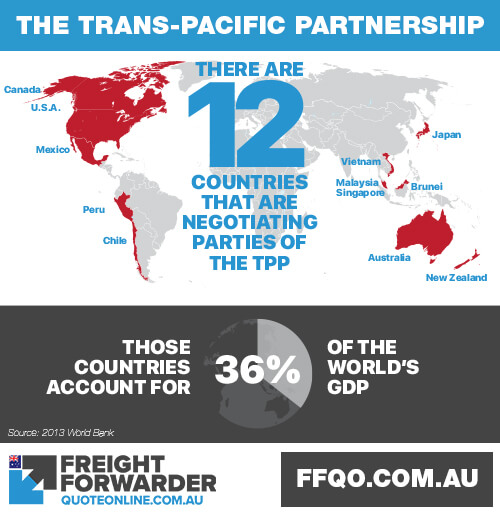Home » News »
What the Trans Pacific Partnership Agreement could mean for Australian freight forwarders
« Previous | Next »
After eight years of negotiations, the Trans Pacific Partnership (TPP) Agreement finally concluded on October 4, 2015. The pact, which is believed to be the biggest in world trade history, is between twelve countries:
- Australia
- Brunei
- Canada
- Chile
- Japan
- Malaysia
- Mexico
- New Zealand
- Peru
- Singapore
- United States
- Vietnam
Many businesses like freight forwarding companies in Australia are curious as to what the agreement could mean for them. While details of it will be made public in late October, here are some of the reported benefits of the TPP that Australian freight forwarders may want looking into.
- Lower tariffs for Australian freight forwarders, importers and exporters
- TPP benefits for existing and emerging industries
- The devil in the details: What you need to know
- Important considerations for Australian freight forwarders, importers and exporters
Lower tariffs for Australian freight forwarders, importers and exporters
By lowering tariffs and setting parameters to ease customs clearances, the TPP aims to encourage more cross-border investments amongst its participating countries.
Consequently, freight forwarders can expect more Australian importers and overseas exporters in the future with TPP measures brooding a healthier environment for foreign trade.
In a report by the Sydney Morning Herald, “The TPP includes new elements that seek to ensure that economies at all levels of development and businesses of all sizes can benefit from trade,” said Capital Economics senior global economist Andrew Kenningham.
However, the extent of the tariff rate changes remain undetermined for Australia as it already has Free Trade Agreements (FTA) with eight [Brunei, Chile, Japan, Malaysia, New Zealand, Singapore, the United States, Vietnam] of the eleven countries. As expected, not all tariffs will be covered by the TPP.
TPP benefits for existing and emerging industries
Trade Remedies and Technical Barriers to Trade are only two among the 30 chapters of the TPP Agreement set to provide benefits for importers and exporters from both existing and emerging industries.
In Australia, among the industry sectors expected to see much trade growth are the following:
Agriculture
Freight forwarders that ship agricultural products have a lot to look forward to as the TPP could effect an increase of up to $3.7 billion in Australian agriculture this 2015.
The TPP would eliminate 98% of tariffs on Australian exports to partner countries and could mean longer-term benefits for the country’s farmers, said National Farmers’ Federation president Brent Finlay.
Australian freight forwarders planning expansion should also consider the following:
- Australian exporters can have more access to the US, thereby, doubling the amount of products they can sell there.
- The agricultural products covered in the agreement range from dairy to rice, to horticulture and seafood.
- Sugar export to the US is another win as the US agreed to open new markets for Australian exporters.
The TPP fell short on the country’s conditions for dairy and sugar. However, “While not reaching the high ambition sought by some sectors, there should be no doubt that Australia needs to be a party to the TPP deal,” added Brent Finlay.
Trade growth in the agricultural sector is considered as the country’s biggest win in the TPP agreement.
Mining, energy and manufacturing
Freight forwarders can also expect an increase in international shipment of mining equipment and technology as well as products from the energy and manufacturing industry sectors.
With the TPP opening more commercial opportunities, exporting goods to countries involved in the pact is a desired consequence of Australia’s participation.
With the TPP agreement, there will be tariff cuts on:
- Copper, nickel, and iron ore shipped to Peru
- Steel and copper products exported to Vietnam and Canada (within 10 years)
- Machinery, mechanical and electrical appliances and automotive parts to Mexico (within 10 years)
- Pharmaceutical products to Mexico (within 10 years)
Meanwhile, there will be removal of tariffs on the following:
- Automotive parts shipped to Vietnam (over 10 years)
- Pharmaceutical products to Peru (over 11 years)
- Duties on paper and paperboard to Peru will also be eliminated (over 11 years)
The devil in the details: What you need to know
As mentioned, details of the TPP agreement will only be publicly released after it has been signed by its participating countries — a fact that worries some concerned Australian lawyers and economists.
The Age’s Peter Martin further points out that:
“A study of the Australia-US free trade agreement 10 years on found it had most probably cut rather than boosted Australian trade. Beforehand we were told it would be worth billions.”
Also, Background Briefing’s Jessie Hill says that the Investor State Dispute Settlement (ISDS) included in the TPP is “the devil in the trade deal”. The ISDS allows investors from TPP countries to sue governments should they find the latter’s actions a threat to their interests.
“What could harm a company’s interests? It could be something straightforward, like a government nationalising a factory. Increasingly, however, cases are being launched against government regulations and policies”, added Hill.
Important considerations for Australians
Australian freight forwarders, importers and exporters
It is not completely clear whether the TPP agreement will succeed in boosting global trade and benefit Australian businesses like freight forwarders.
However, as Adjunct Professor of Law from Sydney University Law School Donald Robertson notes in his opinion article:
“Importantly, the TPP illustrates an understanding among nation states that in a globalised world, their future health depends on that of their neighbours and they need to act accordingly, not out of a desire to advance only their own welfare.”
Benefits to you?
If all goes well, the TPP could mean benefits for us Australians.
Increases in exports by reducing trade barriers within the pact should lead to more jobs in Australia, especially in agriculture and resources.
Lowering or eliminating tariffs means lower costs on importing which should help in reducing the cost of living for all of us. Increases in freight volumes could lead to lower freight costs due to scales of economy.
It certainly will not dramatically improve things for Australians, but it should go a little way to help things along.
What is your take on this matter? Is this good or bad for you and Australian freight forwarders? We would like to hear your thoughts. Post your comments in the box below.
Check out our other recent articles
Latest news
Read up on the latest Australian freight forwarding news and developments:
Marine cargo insurance, should you buy it? - 28 May 2023
Aus UK FTA 2023 highlights in of the new free trade agreement - 07 Apr 2023
Types of cargo shipped via sea freight - 05 Mar 2023

Get social with us
Check us out on Facebook. Get social and like our page. Feel free to post your thoughts - we will appreciate it.
Come see our clips on our YouTube channel and subscribe so you are notified when we add new ones.
To keep up to date with the industry and read up on industry trends and developments, follow us on LinkedIn.
For quick updates, follow us on Twitter.

1300651233